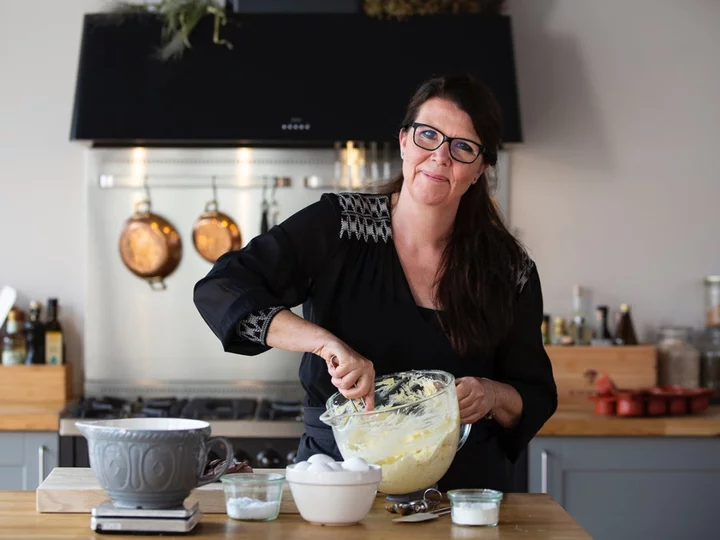
What the hell is Scandinavian food?
Danish pastries are world-famous, but what do you know about the rest of Scandinavian cuisine? With a food philosophy that centres around seasonal produce, perhaps the Scandi approach to cooking is the way forward when considering the environment and the cost-of-living crisis. “It’s very seasonal, lots of vegetables and very clean flavours,” Copenhagen-based chef and food writer Trine Hahnemann says of Danish cuisine. “So salt, pepper, nutmeg; salt, pepper, lemon; salt, pepper, vinegar – it’s not bland at all, we use spices, but we use them one at a time.” Hahnemann, 58, says this emphasis on seasonality helps save money. “It becomes too expensive to buy vegetables that are out of season, that are shipped or whatever,” she explains – but she’s all to aware that the Danish food scene is a bit of a paradox. She mentions produce “that have become everyday things, which people eat every day – like cucumbers, tomatoes and bananas. You can’t convince people there’s also a season for bananas – it’s year round, all the time. They’re the biggest fruit in Denmark”. This doesn’t stop Hahnemann advocating for eating the seasons – which in Denmark means you might be limited to root vegetables and potatoes in the winter. This isn’t necessarily a bad thing, particularly as we’re now coming into summer and there’s a glut of fruit and vegetables available. Summer cabbage, radish, fennel, tomatoes, cucumbers, courgettes, strawberries, tomatoes – they’re all in her shopping basket during this time of year. Hahnemann is a salad fan, and she’s devoted a whole section of her new cookbook, Simply Scandinavian, to them. The chef argues people “don’t take [salads] seriously enough” – and opening a bag from the supermarket won’t quite cut it. “Buy a few vegetables, bake them nicely in the oven with either lemon juice and a little bit of a spice of some kind – it could be garam masala, it could be garlic – then always have a nice dressing. Spend some money on some good oils or good vinegars, because that’s where the flavours are. “Then think about texture… Texture means a lot when we eat.” The moral of the story? “Salads are amazing, because there are no rules – anything can become a salad,” she says. Hahnemann learned traditional Scandinavian cooking from her grandmother, saying: “My favourite dish when I was little that my grandmother would cook for me was meatballs with the cucumber salad.” Her grandma ever explicitly taught her how to make this dish – Hahnemann was instructed to help out, and eventually learned classic Danish recipes through osmosis. “It was much later in my 20s I realised what an amazing gift she’d given me without ever asking if I wanted to be involved – because I was involved, but I was never asked to be part of the cooking. I just saw it all tasted it,” Hahnemann says. Not that feeding Hahnemann was much of a chore: “When I was a child I loved everything. The only thing I didn’t like was a well-done omelette, that was the only thing I couldn’t eat when I was little.” Hahnemann’s grandmother also taught her how to bake, drawing upon the traditional recipes Denmark is famous for. As a child, she practised baking while living on a commune with her parents in the Sixties and Seventies. “There was this idea that children, their creativity should be nurtured, you shouldn’t put limits on things. So I baked all these horrible cakes and the grown-ups would eat them and say, ‘Oh, it’s wonderful Trine’ – and it was nothing like that,” Hahnemann remembers with a laugh. It was only when someone in the commune started giving her tips on beating the butter and sugar before adding the rest of the ingredients that “all of a sudden this world opened up to me about baking”. Hahnemann still uses baking as a tool when she’s “really stressed out”, and has a bakery in Copenhagen putting the spotlight on traditional Scandinavian bakes like cardamom buns and rye bread. She says baking is “the most important thing” about Scandinavian cuisine. “Because of the rye bread, and the whole lunch concept of open sandwiches on the rye bread. The whole breakfast is about bread, then you have all the celebratory baked goods – that you can say we now eat on a more regular basis.” While Hahnemann accepts some “traditions are disappearing, because everybody’s working so much”, she’s keen to keep the spotlight on traditional buns, breads and baking. When she recently taught a baking class, she was “so happy” to have a group of male friends in their 20s sign up, saying: “I think it’s important to keep it alive.” ‘Simply Scandinavian’ by Trine Hahnemann (Quadrille, £27).
2023-06-29 13:53
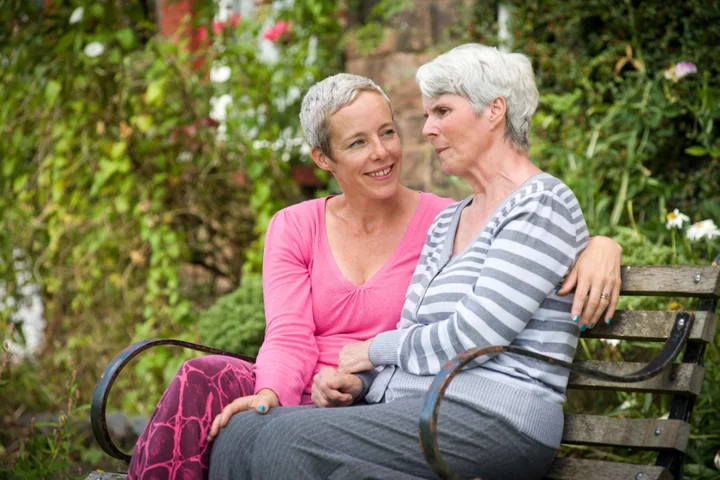
Dementia diagnosis could be sped up thanks to AI
A new artificial intelligence (AI) tool may be able to look for early signs of dementia and Alzheimer’s disease, speeding up diagnosis. The technology, which could help doctors assess the early signs of the condition more efficiently, has been developed by researchers at the University of Sheffield. Known as CognoSpeak, the system uses a virtual character displayed on a screen to engage a patient in a conversation. It asks questions to test memory, inspired by those used in outpatient consultations and conducts cognitive tests, such as picture descriptions and verbal fluency tests. This tool could help patients start treatments sooner, reduce waiting times and give people certainty earlier Dr Dan Blackburn, University of Sheffield After that, the tool uses AI and speech technology to analyse language and speech patterns to look for signs of dementia, Alzheimer’s disease and other memory disorders. Researchers behind the technology suggest it could play a key role in reducing the burden on dementia assessment services, once further testing in GP and memory clinics across the UK is complete. The National Audit of Memory Assessment Services in England and Wales, conducted between January and August 2021 by the Royal College of Psychiatrists and supported by Alzheimer’s Society, found that the average waiting time from referral to dementia diagnosis had increased to 17.7 weeks. This was up from 13 weeks in 2019, with waiting times across services nationwide ranging between zero and 104 weeks (two years), compared to three and 34 in 2019. There are currently around 900,000 people in the UK living with dementia, and this is projected to almost double by 2040, according to the Alzheimer’s Society. Dr Dan Blackburn, from the University of Sheffield’s Department of Neuroscience, said: “Waiting for a possible diagnosis of dementia can be a very anxious time for patients and their families. “This tool could help patients start treatments sooner, reduce waiting times and give people certainty earlier. “The CognoSpeak system could transform how dementia and other memory disorders are diagnosed by speeding up assessments. “This would also free up clinicians’ valuable time and mean that those who need specialist care get access to it as quickly as possible.” Also an Honorary Consultant Neurologist at Sheffield Teaching Hospitals NHS Foundation Trust and researcher at NIHR Sheffield BRC, he added: “There is a real clinical need for this kind of technology. “There are long waiting lists for memory clinics across the UK, but there are also inequalities in accessing the memory clinics service. “The CognoSpeak tool can reduce these inequalities and help make the service more efficient.” The CognoSpeak system could transform how dementia and other memory disorders are diagnosed by speeding up assessments Dr Dan Blackburn Professor Heidi Christensen, from the University of Sheffield’s Department of Computer Science, added: “The way a person speaks can tell us a great deal about their cognitive health and emotional wellbeing, and give us a very early indication of any signs of cognitive decline that may not otherwise have been detected. “The system we’ve developed here at Sheffield uses speech technology to automatically extract these signs and the automation means we can provide a consistent, accurate and fast assessment for everyone. “CognoSpeak is advanced, high tech and based on world-leading research in this field. “We have the biggest collection of data for this type of assessment anywhere in the world, which we’re using to advance the technology and improve its accuracy.” The system is being designed in a way that means once it is fully rolled out, a GP could refer a person with memory complaints to use the technology. CognoSpeak would send the test results back to the GP and then they would decide whether to refer the patient to a memory clinic for further assessment. The programme can be accessed through a web browser – meaning patients are able to take the test in the comfort of their home, rather than having to wait for a hospital appointment to take a pen-and-paper-based assessment. Researchers say early trials have shown the technology is as accurate at predicting Alzheimer’s as the current written tests used to assess or screen for cognitive, memory or thinking impairments. According to the team, previous research has demonstrated accuracies of 90% for distinguishing people with Alzheimer’s from people that are cognitively healthy. Developed by Dr Blackburn and Prof Christensen, the system is still in the research phase, but a £1.4 million National Institute for Health and Care Research (NIHR) grant will allow it to be trialled more widely. The researchers are recruiting 700 participants from memory clinics across the UK to help develop the system further. The tool has been developed in collaboration with Therapy Box – a company specialising in speech and language technology – and the National Institute for Health and Care Research (NIHR) Devices for Dignity MedTech Cooperative (D4D). Read More Charity boss speaks out over ‘traumatic’ encounter with royal aide Ukraine war’s heaviest fight rages in east - follow live Reading for pleasure in childhood boosts brain health in teenage years – study Stan Wawrinka on setbacks, preparing for Wimbledon and friendship with Roger Federer Hacks for saving money on school uniforms
2023-06-29 13:51

Nissan Leaf 2024 'Refresh' Doesn't Fix Its Charging Problem
The 2024 Nissan Leaf will be slightly more expensive despite not updating its two biggest
2023-06-29 05:18

Chrissy Teigen and John Legend welcome fourth child via surrogate: ‘Our new love’
Chrissy Teigen and John Legend have announced the arrival of their fourth child, a baby boy born via surrogate. On Wednesday, the cookbook author, 37, and the “All of Me” singer, 44, shared the news that their family had expanded once more on Instagram, where they revealed they’d welcomed a son named Wren Alexander Stephens on 19 June. On Teigen’s Instagram, she reflected on the couple’s surrogacy journey in a lengthy post, in which she revealed that she’s wanted four children for “as long as [she] can remember”. In the emotional post, Teigen then reflected on the loss of her and Legend’s unborn child, Jack, in 2020, with the model revealing that she didn’t think she’d be able to “carry any more babies on my own”. According to Teigen, who gave birth to her and Legend’s third child, a daughter named Esti, in January 2023, she and the singer reached out to a surrogacy agency in 2021 about the possibility of “having two tandem surrogates, each to bring us a healthy baby boy or girl”. However, Teigen revealed that, early on in the surrogacy journey, she also decided that she wanted to try getting pregnant “just one more time”. “If it doesn’t work, we will be okay. We’ve already seen the worst,” she wrote. “I promised I would be okay no matter what happened.” According to the Cravings author, at that point, she and Legend started undergoing IVF, which she noted was the same process that allowed the couple to welcome their daughter Luna, seven, and son Miles, four. “We made new embryos. We did my transfer, and were so happy to learn it worked - we were pregnant with our little girl, Esti,” Teigen wrote, adding that “around this same time,” the couple also met the “most incredible, loving, compassionate surrogate we could ever imagine”. In the candid post, Teigen revealed that the first embryo transfer to their surrogate “didn’t survive,” before noting how “hard” their surrogate fought to prepare for a second transfer. According to Teigen, she and Legend didn’t want to rush the process, and so they were “patient” as she enjoyed the first trimester of her pregnancy “with, of course, a little bit of fear that isn’t any different from any other expecting couple”. Teigen said she and Legend learned that their surrogate was pregnant with a boy as they “crept toward the safe zone” of her own pregnancy, with the celebrity chef writing that she and the family’s surrogate celebrated together with their “growing bellies, our families blending into one for the past year”. In the post, Teigen then revealed that she’d gotten to witness as the “most beautiful woman, my friend, our surrogate,” gave birth “just minutes before midnight” on 19 June. Teigen concluded the lengthy post expressing her gratitude to her surrogate for the “incredible gift” before sharing a photo of their surrogate and one of the couple holding their newborn child in the hospital. The final photo showed a close-up shot of the baby. “Our hearts, and our home, are officially full. And to our Jack, we know both their angel kisses are from you,” she wrote. Legend also shared the news of the baby’s arrival on his Instagram, where he posted a photo of himself surrounded by his and Teigen’s four children, as well as the photo of the couple cradling their newborn. “Wren Alexander Stephens, our new love,” Legend captioned the album. More follows… Read More Chrissy Teigen responds to critics claiming she has a ‘new face’: ‘I gained weight’ Chrissy Teigen praised for thanking team of four nannies in Mother’s Day tribute ‘My small rash turned out to be a parasite living in my leg after a beach trip’ Bre Tiesi reveals whether she’d have another child with Nick Cannon How do I get a mammogram screening?
2023-06-29 03:27

Bre Tiesi reveals whether she’d have another child with Nick Cannon
Bre Tiesi has revealed whether she’d have another child with Nick Cannon, who is already the father of 12 children. The Selling Sunset star shared her thoughts about expanding her family during a recent interview with Entertainment Tonight. Tiesi has one child, Legendary Love, who she welcomed with Cannon in June 2022. According to Tiesi, she’s not sure if she wants to have another child, given how focused she’s been on her career. “I do and I don’t,” she said. “I think that for where I’m at in my career and my life right now, I just don’t know how I could possibly manage another child.” However, she went on to note that she’s not against the possibility of giving Legendary a younger brother or sister. “Part of me does want to give him another sibling, but he has a few of those, so I don’t think he’s necessarily missing out, but it’s hard. I don’t know,” she said, referring to her son’s many half siblings. In addition to Legendary, Cannon welcomed four other children in 2022 with different women. He welcomed his daughter, Onyx Ice Cole, with model LaNisha Cole in September, and his son, Rise Messiah, with Brittany Bell in October. Cannon and Bell also share a six-year-old son, Golden, and two-year-old daughter, Powerful Queen. In November, the comedian and Abby De La Rosa welcomed their daughter, Beautiful Zeppelin Cannon. This is the pair’s third child, as they also share two-year-old twins, Zion and Zillion. The Masked Singer host and Alyssa Scott welcomed their daughter, Halo Marie, in December, one year after their son, Zen, died from a rare brain tumour. In addition, the comedian shares his 12-year-old twins, Moroccan and Monroe, with ex-wife Mariah Carey. Speaking to Entertainment Tonight, Tiesi said that she’s spoken to Cannon about having more children and that he’s “open to whatever”. However, she echoed that if she “can’t do it a hundred per cent, I don’t want to do that”. The realtor also acknowledged that she’s still working on balancing her professional and personal life as a mother of one. “I don’t want to take more attention away from my son than I already do, working like I do, so I’m really trying to figure out how to manage that, and I think adding in another aspect of another human would be very hard,” she explained. Elsewhere in the interview, Tiesi spoke candidly about her unconventional relationship with Cannon, and praised him for being so involved in their child’s life. “So, here’s the thing that I know everyone wants to argue with me about - but he makes his own schedule,” she said. “He can show up every day, when he stops from work. He can come at night. So, he’s here every week, and especially when he’s home, he’s here.” She noted that while she and Cannon don’t have a “set schedule” or “plan things,” he’s still extremely “supportive” of her. “He’s very present and he’s at anything and everything I ask him to be at. So, I’m very happy. He’s very supportive,” she said. During an episode of Selling Sunset that aired last month, Tiesi described her relationship with Cannon as “open,” noting that her “situation is interesting” and that she wouldn’t say she’s “single”. “I don’t want to call it open, but open relationship, I guess. I just know we just had a baby, we’re really happy, so I’m happy in my relationship now,” she said. “I’m not a monogamy kind of person. Everything I’ve ever seen is divorce, and people are unhappy and it ends badly, and the kids suffer. Men can’t keep it together. It’s never us.” Read More Nick Cannon shares Mariah Carey’s ‘high frequency’ reaction to actor having 12 children Nick Cannon accused of misogyny over ‘pathetic’ Taylor Swift remark Nick Cannon forgets one of his children when asked to name all 12 How do I get a mammogram screening? Jonnie Irwin makes rare red carpet appearance as he says ‘every day is a gift’ Nicolas Cage fans praise actor for ‘sweet’ gesture to his son on a plane
2023-06-28 23:26
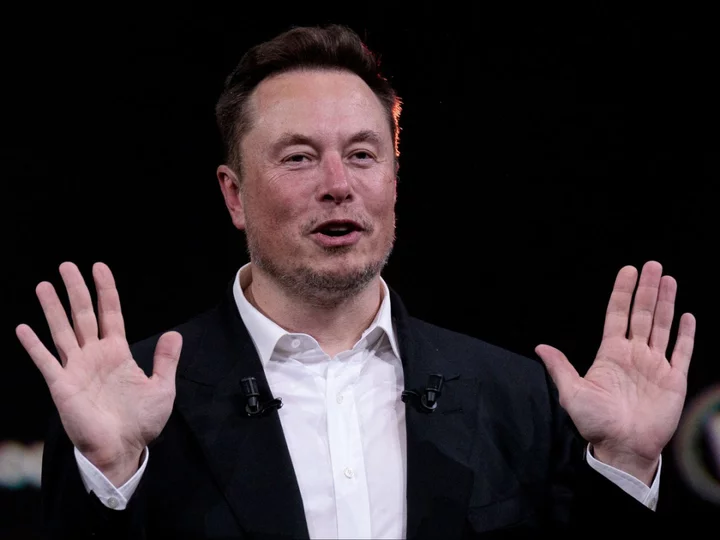
Elon Musk ‘microdoses ketamine to manage depression’, report says
Elon Musk reportedly takes “microdoses” of “ketamine”, a drug he has praised as being “a better option” than antidepressants when “taken occasionally”. The SpaceX founder is said to use the dissociative anaesthetic to manage depression. Musk, 52, previously tweeted in 2017 about his struggles with mental health. Speculating that he could have bipolar disorder, he spoke of how he experienced “great highs, terrible lows and unrelenting stress”. According to The Wall Street Journal(WSJ), people close to Musk have witnessed him using ketamine in small doses. Following the publication of WSJ’s article on Tuesday (27 June), Musk tweeted that while depression is “overdiagnosed” in the US, it is a “brain chemistry issue” for some people. He believed that “zombifying people” with selective serotonin uptake inhibitors (SSRIs), a widely used type of antidepressant medication, “happens way too much”. “From what I’ve seen with friends, ketamine taken occasionally is a better option,” Musk added. The Independent has contacted Musk for comment. His attorney and top advisor did not respond to WSJ’s request for comment, it was reported. In 2017, Musk answered questions from Twitter users about his personal life and was asked about his mental health. He wrote: “The reality is great highs, terrible lows and unrelenting stress. Don’t think people want to hear about the last two.” When asked if he had bipolar disorder, the South African entrepreneur simply replied: “Yeah.” According to the NHS, bipolar disorder is characterised by extreme mood swings that can range from extreme highs (known as ‘mania’) to extreme lows (depression). It can be treated in several ways, including taking medication to treat prevent and stabilise episodes of mania and depression. In a later tweet, Musk added that he may not be “medically” bipolar, but said he does not know. “Bad feelings correlate to bad events, so maybe [the] real problem is getting carried away in what I sign up for,” he wrote. Microdosing involves consuming small doses of drugs, usually psychedelic or sub-hallucinogenic substances such lysergic acid diethylamide (LSD) or mushrooms with psilocybins. Ketamine is an approved drug in the US for treating severe depression that has not improved with other therapies. In the UK, it is approved as an anaesthetic drug by the Medicines and Healthcare Products Regulatory Agency (MHRA), but not for use in treating depression. However, in 2019, a drug similar to ketamine – known as esketamine, which is taken as a nasal spray – was approved in the UK for treating severe depression. Read More Walk this way... but not like that: How men’s walks became sexualised Sarah Ferguson reveals she almost skipped doctor’s appointment that led to cancer diagnosis Influencers face backlash for promoting Shein factory during PR trip in China Elon Musk vs Mark Zuckerberg: Who would win a fight between tech titans? Elon Musk’s sister says she’s been overcharged due to her last name Nicolas Cage once bought a plane seat for his son’s imaginary friend
2023-06-28 19:24

New mum has all teeth removed after rare condition made them fall out during pregnancy
A mum who had her teeth removed after she vomited so much while she was pregnant - has gone on to have more children and embrace life. Louise Cooper, 26, became pregnant for the first time while she was working as a nanny at a ski resort in France. A week after finding out, the mum-of-three said she got so sick she had to move back to the UK. Louise was diagnosed with Hyperemesis Gravidarum (HG) in April 2017 – a condition which affects around 1% of women. Louise would vomit so frequently, her teeth started falling out. Her first child, Zachary, five, was born in November 2017 and six months later Louise had to have all her teeth removed as they were so damaged. Since then, Louise has had two more children, has embraced life without teeth and often goes out without wearing her dentures. Louise, a hairdresser, from Reading, Berkshire, said: “Life is alright now, everything has gone back to normal. “Life is a lot more relaxing and enjoyable. It is not enjoyable when you have HG and are in bed for nine months. “I have embraced having no teeth. I have only really just come to terms with everything in the past year. “It has restricted my diet - I don’t eat a lot of meat anymore. “I mainly stick to eating vegetables.” Louise fell pregnant with her first child in February 2017. A week after she found out she was pregnant, Louise’s sickness was so bad she returned home to be with her family. Three months after falling pregnant, Louise wasn’t getting any better and was bed bound for much of her pregnancy. In April 2017, Louise was diagnosed with Hyperemesis Gravidarum (HG) - excessive nausea and vomiting. Louise said: “The damage was caused by the acid from vomiting. “I lost my first tooth around 16 weeks and it was just out of nowhere. “I was told that my teeth would need to be removed as they were so damaged. “I gave birth to my son in November 2017 and six months after that I had my teeth removed.” After the birth of her son, Louise has had two more children - Ollie, three, and Oakley, 11 months - and every time she has suffered from HG. She said: “HG disappears when the baby is delivered. “However I had more than one child and I have suffered from HG every time. “I would say my diet isn’t the healthiest as it is restricted from trauma. “I have a lot of trauma about food groups, it is so traumatic to go through severe vomiting for nine months - it was none stop. “It is hard to go back into a routine of understanding that food won’t make me vomit anymore. “It was very traumatic, I wouldn’t wish it upon my worst enemy. “A lot of people compare it to the side effects of chemo as you feel like you are dying. “It is unpleasant. It is emotionally and physically draining.” Within the last year, Louise said she has only just managed to come to terms with having no teeth and will now leave the house without her dentures. She said: “I have accepted the fact I have no teeth. “I have dentures now but they are not the most comfortable things to wear as they are cosmetic. “They are also very triggering for the traumatic side of HG. “I can now leave the house without having teeth in. Life is more relaxing and enjoyable for me.” Read More Why are Russian and Belarusian players allowed back at Wimbledon? Matt Hancock seeks to humiliate himself in public again Intermittent fasting ‘no better for weight loss’ than calorie counting British toddler has American accent after watching popular YouTube show GB News in ‘significant breach’ of Ofcom rules over Covid vaccine claims
2023-06-28 17:18
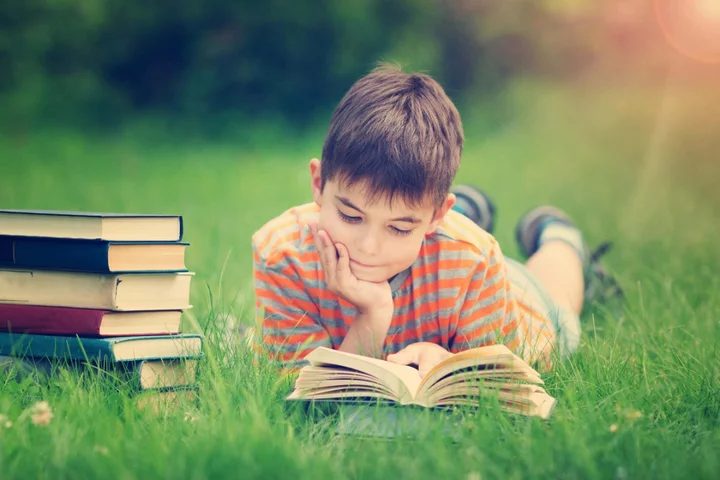
Reading for pleasure in childhood boosts brain health in teenage years – study
Reading for pleasure in early childhood can help youngsters perform better at school and boost their mental health as they enter teenage years, a study suggests. The study of more than 10,000 children found that those who started reading for fun at a young age performed better at cognitive tests and showed improved “brain structure” in adolescence. For “optimal” results, children should be reading for 12 hours every week, academics from the universities of Cambridge and Warwick in the UK, and Fudan University in China, found. Their study, published in the journal Psychological Medicine, analysed data on the children, all from the US, including interviews, cognitive tests, mental and behavioural assessments and brain scans. We encourage parents to do their best to awaken the joy of reading in their children at an early age Professor Jianfeng Feng They then compared information on children who began reading for pleasure before they turned nine against those who started later, or not at all. Of the 10,243 participants studied, just under a half (48%) had little experience of reading for pleasure or did not begin doing so until later in their childhood. The other half had between three and 10 years’ reading for pleasure. Those who started reading for pleasure at a young age were found to perform better on cognitive tests, which measured verbal learning, memory and speech development, and school academic achievement, when they were teenagers. These children also had better mental wellbeing, showing fewer signs of stress and depression, as well as improved attention and fewer behavioural problems such as aggression and rule-breaking. They also tended to use screens less and slept longer. Academics also analysed brain scans of teenagers and found that those who started reading for pleasure at a young age showed moderately larger total brain areas and volumes, and also showed differences in brain regions previously shown to relate to improved mental health, behaviour and attention. “Reading isn’t just a pleasurable experience – it’s widely accepted that it inspires thinking and creativity, increases empathy and reduces stress,” said Professor Barbara Sahakian from the Department of Psychiatry at the University of Cambridge. “But on top of this, we found significant evidence that it’s linked to important developmental factors in children, improving their cognition, mental health, and brain structure, which are cornerstones for future learning and well-being.” Professor Jianfeng Feng from Fudan University in Shanghai, China, and the University of Warwick, added: “We encourage parents to do their best to awaken the joy of reading in their children at an early age. “Done right, this will not only give them pleasure and enjoyment, but will also help their development and encourage long-term reading habits, which may also prove beneficial into adult life.” Read More Charity boss speaks out over ‘traumatic’ encounter with royal aide Ukraine war’s heaviest fight rages in east - follow live Stan Wawrinka on setbacks, preparing for Wimbledon and friendship with Roger Federer Hacks for saving money on school uniforms King Charles and Queen Camilla surprise spa guests in bathrobes at eco-village
2023-06-28 16:53
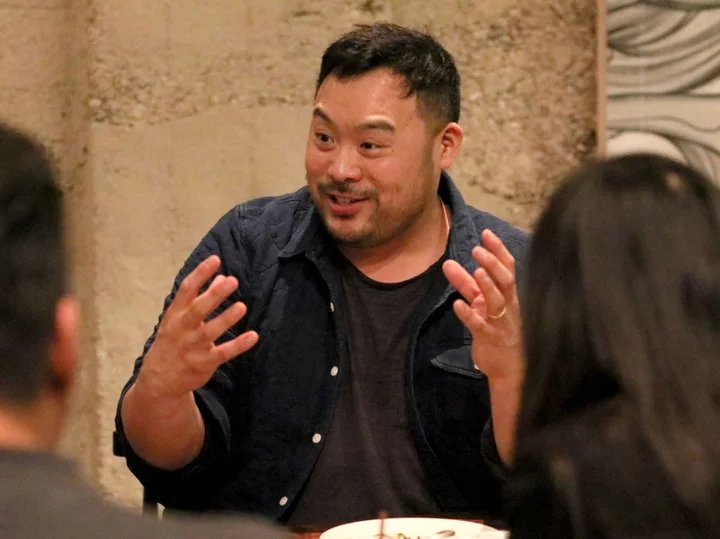
‘This could get me in trouble’: Michelin chef comes up with controversial alternative to barbecuing burgers
Michelin-starred chef David Chang has poured cold water on the idea that grilling burgers on a barbecue is the optimum way to cook them. The founder of Momofuku Ko, which has two Michelin stars, said that barbecuing patties only serves to turn them into “carbonised crap”, but people keep cooking them like this because of the socialising that is associated with cooking outdoors. On his podcast The Dave Chang Show, the controversial chef suggested that using a griddle to cook burgers is a superior method. Chang, 45, said: “Grills suck for burgers. We have assumed as a culture that in summer, we eat a burger and it’s grilled. “I actually think the grill is a horrible thing for the burger… I think this viewpoint could get me in trouble,” he admitted, but pressed on with his argument against the grill. “The success rate of the griddle is better than the grill, and also there’s no clean up, you have nothing to worry about.” The Korean-American restaurateur continued: “A juicy burger is going to turn into a guaranteed grease fire [on a barbecue], why use it? This whole idea of imparting flavour from the grill, the only flavour that’s being imparted is the carbonised crap that’s on it. “You would need to cook a burger over charcoal for 12 hours to get that smoky flavour. “A backyard burger is an experience that you try to convince yourself is better than it actually is,” he claimed. “It’s the nostalgia, it’s the smells, it’s your friends. But if you actually take it out of the context, it’s not that good.” Chang went on to allege that the close relationship between burgers and grills “is a marketing lie”. “How many places where you think have a good burger, cook it on a grill?” he challenged. However, he did have some praise for barbecued foods. Chang said that grilling corn was “clearly the only champion” and he “can’t think of anything else” that makes corn taste quite as good. Chang has previously shared his opinions on burgers that landed him in trouble. In 2015, he provoked the ire of Australians when he wrote in his blog Lucky Peach: “You know who f***s up burgers more than anyone else in the world. Australians. Australia has no idea what a burger is. “They put a fried egg on their burger. They put canned beetroot on it, like a wedge of it. I am not joking you. This is how they eat their burger.” He also laid waste to the use of wagyu – beef that comes from cattle that is bred in Japan and is highly prized for its marbled fat content – in burgers. In his “burger manifesto”, Chang wrote that it was “the dumbest burger in the world” to use wagyu. “It’s like 70 per cent fat content – it’s disgusting. Would you eat a ground bacon burger? That’s what you’re doing with a wagyu burger,” he said. “Or the idiots that have ‘kobe beef wagyu sliders with a trio of ketchup’ on their menu – that drives me insane.” The chef is also known for speaking candidly about his toxic behaviour while working in kitchens in the past. In his 2020 memoir Eat a Peach, Chang wrote: “When I’m angry, I seethe with such intensity that it can’t simply be emotional. It’s like I’m an animal registering danger.” Hannah Selinger, an award-nominated journalist, wrote in her essay for Eater that “in all my years of restaurant work, I had never seen anything like the roiling, red-faced, screaming, pulsing, wrath-filled man that was David Chang”. She worked as corporate beverage manager at the Momofuku restaurant group in 2008. Chang responded to Selinger’s essay and said that while he didn’t recall specific incidents mentioned by her, “they are entirely consistent with my behaviour at the time, which I did not begin to correct until several years later”. He added that “the bottom line is that I’m sorry”. Apart from his podcast, Chang also hosted Netflix’s travel and food series Ugly Delicious from 2018 to 2020. The show aired two series and featured celebrity guests including Jimmy Kimmel and Nick Kroll. Read More Walk this way... but not like that: How men’s walks became sexualised Jonnie Irwin makes rare red carpet appearance as he says ‘every day is a gift’ Influencers face backlash for promoting Shein factory during PR trip in China Budget Bites: Three light recipes that sing of summer Danny Dyer explains why he has a Toby Carvery Platinum Gold Card Three quick and easy plant-based fakeaways to create at home
2023-06-28 16:51

Stan Wawrinka on setbacks, preparing for Wimbledon and friendship with Roger Federer
With Wimbledon starting next week, Stan Wawrinka is excited about returning to London’s iconic championships. “It’s really a different tournament with the history, also the fact that we play on grass courts. The courts are amazing, the atmosphere is great,” he says on a video call from the All England Lawn Tennis and Croquet Club. Today, the Swiss player is taking a break from his gruelling training schedule to visit SW19 as part of his long-running partnership with Evian. “It’s always special for us players to go practise or to play matches on small courts as well, because you have so many fans coming and the atmosphere is always going to be special,” he continues, saying his most memorable Wimbledon match was against a certain Swiss opponent. “I played one quarter final against Roger [Federer] on Centre Court – it’s always special to play Roger, to play him here was something really nice.” Ahead of the famous championships, the 38-year-old has been training in Monaco, before heading back to London this week. So, how does the three-time Grand Slam winner balance the physical and psychological aspects of preparing for high-profile events? “It’s all a big puzzle,” says Wawrinka, who was born near Lausanne to a German father and Swiss mother. “As a tennis player, you have the fitness side and you have the mental part – you have everything that you need to do to be ready.” Plus, there’s the challenge of having to deal with defeats: “Tennis is a tough sport in the way that you end up almost every week losing. You need to accept [that you will] lose and try to learn and take something positive from it.” How does the former world number three cope with not winning? “I try to refocus on myself, try to also think about everything I’ve been doing in practice… you can lose against a better player. If you know you’re doing the right things, then you can only be positive about it.” Stan the Man (as he’s known to fans) isn’t fazed by comparisons to Federer – whom he’s beaten on just three of the 26 times they’ve competed on court. “I always look for the positive of the situation and I’ve been lucky enough that when I arrived [on the circuit] I was a little bit younger than him – he was already at the top,” says Wawrinka, who is three years younger than his record-breaking countryman. “For me, it was a chance to have Roger in the same country… I had the chance to practise with him and he became a friend.” The pair were victorious at the Davis Cup in 2014 and at the Beijing Olympics in 2008, taking gold in the men’s doubles. “The Olympics are something that any athlete in any sport dreams about, to play individually, but [playing] doubles and to feel like a team it was super special,” Wawrinka recalls. How does training for doubles matches compare to singles? “It’s more the mental part. You need to know your partner, talk with him a lot about the tactics, but more about what’s going to happen. “Communication is really important on the court, but also off the court. For us, it was quite easy to play together because we are such close friends.” Seen as a late bloomer in terms of tennis, Wawrinka admits it was a struggle waiting to achieve his inaugural Grand Slam title at the Australian Open in 2014. “For me, the most challenging part was to find the confidence in myself and in my game. I only won my first Grand Slam at 29 years old, it took me a while to really find that confidence.” Suffering setbacks throughout his career due to knee, elbow and foot injuries, Wawrinka’s ranking has yo-yoed in the past few years, but he returned to the world top 100 in February. “It was tough to be back at 37 years old after more than a year out for another two surgeries,” he says. “It was not easy, but for me, it’s about the passion. I love what I’m doing, I enjoy the process… it was, of course, so special to be back again in the top 100.” Off the court, he unwinds by spending time with daughter Alexia, 13, whom he shares with ex-wife Ilham Vuilloud, a Swiss TV presenter: “I’m traveling a lot so I don’t have that much time to be with her, so I’m trying to enjoy that.” Having grown up on his parents’ biodynamic farm, the tennis champ has inherited the green-fingered gene, growing fruit and veg in his garden back home in Switzerland. “I have tomatoes, courgettes, I have many fruits. I think it’s just different when you have your own garden than when you go buy it at the shop directly.” Reducing his impact on the environment is also a priority for the Evian global brand ambassador, which is why he’s pleased the water brand is introducing refillable bottles for players at Wimbledon for the first time this year. “It’s important for us, the players, [because] we’re traveling a lot – this new bottle is going to be great,” Wawrinka says. Two years away from 40 and with 16 career titles and 550 career wins under his belt, he’s not planning on hanging up his racket any time soon. “I’m still hoping to play a few more years on tour. It’s, of course, not easy, but I’m passionate about it. I want to enjoy it as much as I can,” Wawrinka says. “The time I will stop there will be no way back, so I need to really push and try to be as good as I can.” Evian, official water of the Championships, together with Wimbledon have launched a new refillable solution to hydrate players on court during this year’s tournament. Discover more at www.evian.com. Read More Charity boss speaks out over ‘traumatic’ encounter with royal aide Ukraine war’s heaviest fight rages in east - follow live Hacks for saving money on school uniforms King Charles and Queen Camilla surprise spa guests in bathrobes at eco-village Nearly 1.5m 18 and under referred for mental health support in 2022 – charity
2023-06-28 16:23
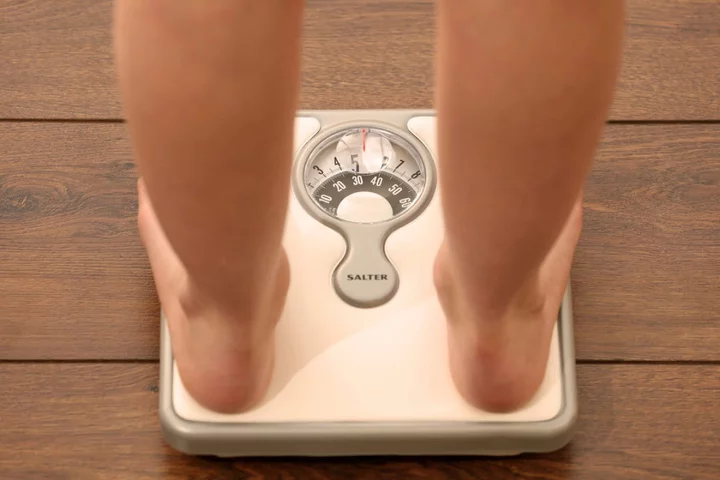
Intermittent fasting ‘no better for weight loss’ than calorie counting
Time-restricted eating, commonly known as intermittent fasting, may produce similar weight loss results for adults with obesity compared to traditional calorie counting, according to a new study. The small clinical trial, whose results were published on Tuesday in the journal Annals of Internal Medicine, found that participants who engaged in 8-hour time restricted eating had improved insulin sensitivity compared to those in the control group who ate their calories any time over 10 or more hours a day. Over a billion people worldwide are obese with the with the disease projected to grow in prevalence across the globe, according to the World Health Organization. Obesity has also been found to be a serious risk factor for other metabolic diseases such as type 2 diabetes, heart disease, and some types of cancer. A widely adopted tried-and-tested method to lose weight is to burn more calories than one consumes, and to achieve this, individuals typically count the calories of the food they eat each day. While this traditional approach for losing weight involves counting calories, time-restricted eating, without calorie counting, has also emerged as a popular strategy as it is easier to follow. However, whether intermittent fasting is as effective in producing weight loss, especially beyond the short term, has remained unclear. In the new research, scientists from the University of Illinois Chicago studied 90 adults with obesity from the Greater Chicago area to determine whether intermittent fasting or calorie restricted eating would be more effective for weight control and heart disease risk reduction. Researchers randomly assigned participants to 1 of 3 groups: 8-hour time-restricted eating from noon to 8:00 pm only without calorie counting; reducing a fourth of their calories daily; or no change in calorie consumption with eating taking place over 10 hours or more throughout the day. Participants who followed time-restricted eating and those adopting calorie restriction met regularly with a dietician. The study found that participants who engaged in time-restricted eating ate 425 fewer calories per day than the control group and lost about 4.5kg (10lb) more than the control group after one year. On the other hand, the calorie-restricted group ate 405 fewer calories per day and lost about 5.5kg (12lb) more after one year, with participants in both groups showing high adherence to their interventions. Scientists believe the new study and its findings can help make better-informed clinical decisions by taking individual preferences into consideration, rather than just choosing a diet that may be more effective. Researchers also point out that access to dieticians likely helped the participants make healthier food choices. As there was substantial individual variability in weight loss among participants using these interventions, they called for further research to determine who would most benefit from each of these diet choices. Read More Scientist behind Ozempic says drug can make life ‘so miserably boring’ Teens with severe obesity are turning to surgery and new weight loss drugs, despite controversy Two children were born with ‘insatiable hunger’ that left them severely obese. Now scientists know why British toddler has American accent after watching popular YouTube show GB News in ‘significant breach’ of Ofcom rules over Covid vaccine claims NHS unions vote to accept government pay deal – but nurses could still strike
2023-06-28 15:46

Jonnie Irwin makes rare red carpet appearance as he says ‘every day is a gift’
Jonnie Irwin has said that he “takes every day as a gift as it comes” amid his treatment for terminal cancer. The A Place in the Sun presenter, 49, made a rare red carpet appearance at the Television and Radio Industries Club (TRIC) Awards on Tuesday night (27 June) in London. Irwin also spoke about the support he has received from the BBC’s Escape To The Country production team and said they “put their arm around me” after he divulged his diagnosis. The TV host publicly revealed that he had been diagnosed with lung cancer that had spread to his brain in November 2022, after keeping it a secret among close friends and family for two years. He told The Mirror at the TRIC Awards: “Today is a good day. Yesterday I peeled myself out of bed and munched painkillers but so far so good today. I take every day as a gift and as it comes.” Irwin previously claimed that Channel 4 “pushed him aside for someone healthier” after discovering his terminal cancer diagnosis and told him they didn’t “think they can get the insurance”. He spoke of being “heartbroken” by the broadcaster, adding: “I just feel I’d earned a bit more from them after 18 years”. Channel 4 representatives said the production company “were unable to secure adequate insurance cover” for Irwin. However, Irwin had nothing but praise for Escape To The Country, which he described as “family” to him. “With a notable exception from one production company, as soon as they found out they put their arm around me and, insurance provided, they looked for work when I could,” he said. “So any location that was anywhere near me I was [the] first candidate for and they really helped me find work. They were understanding, especially with travel arrangements. They were so supportive, I can’t thank them enough.” Escape To The Country was nominated for the Daytime TV award at the event, alongside A Place in the Sun. The latter won the category at the end of the night. Prior to the winners being announced, Irwin described the production team as “family” and said the nomination was “recognition” for all their work. “I’ve worked on Escape for coming up to 10 years, but 20 years in the industry and I’ve had the most fun and it’s the most like a family of all the shows I’ve done,” he added. When he first revealed his diagnosis, Irwin said he “doesn’t know how long” he has left to live, but hopes he will inspire people to “make the most of every day”. Earlier this month, he celebrated his “best ever” Father’s Day with his three sons, four-and-a-half-year-old Rex and three-year-old twins Rafa and Cormac. He shares his children with wife Jessica Holmes. It came after he revealed in an interview with Hello! magazine ahead of Father’s Day that he has not told his sons about his terminal cancer, saying it would “be horrible news that they’d have to get their heads around”. “And it would confuse the hell out of Rex – he’s got a shocking enough day coming,” Irwin said. “Let’s bury our heads in the sand for as long as possible.” Read More Walk this way... but not like that: How men’s walks became sexualised Jennifer Lawrence addresses Liam Hemsworth affair rumours after Miley Cyrus’s ‘Flowers’ music video ‘I don’t deserve this’: Tom Hanks’ niece has screaming meltdown on Claim to Fame Jonnie Irwin celebrates ‘best Father’s Day ever’ amid terminal cancer diagnosis Jonnie Irwin ‘removes himself’ from family home amid terminal cancer battle Nicolas Cage once bought seat on plane for son’s imaginary friend, Minnie Driver says
2023-06-28 15:21
